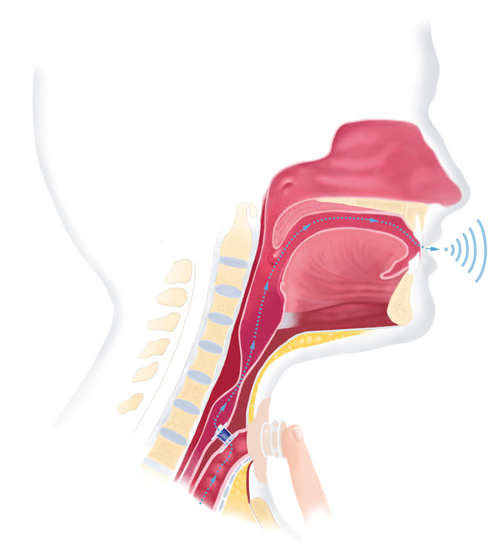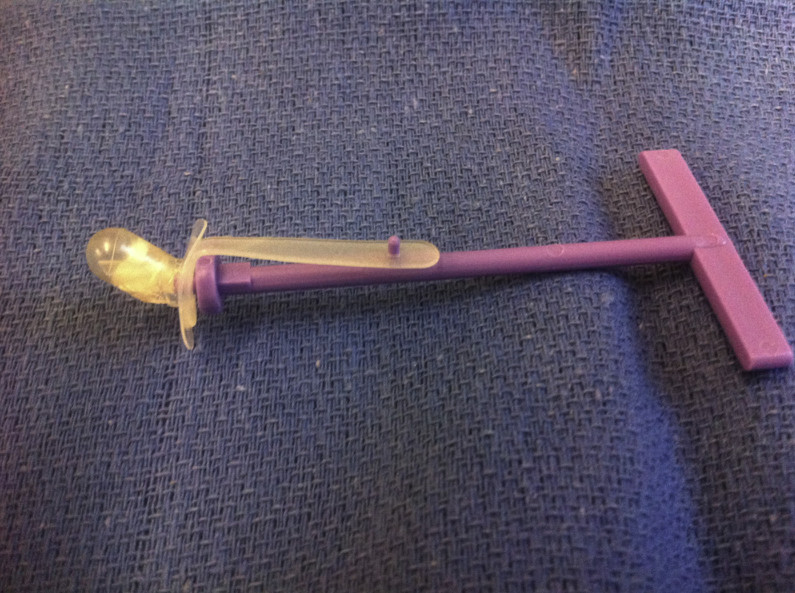Speech prostheses
Speech prostheses, or voice prostheses, is a overall term for small, silicon one-way valves that are inserted into the tracheo-oesophageal puncture of laryngectomy patients. The prosthesis not only safely divides the oesophagus and trachea, but also allow speech when the outside of the tracheostoma, the opening on the neck to allow air in, is covered with a finger or otherwise occluded. This is greatly beneficial to patients because it allows to communicate without the need to use either an Electrolarynx or Speech synthesizers.
Contents
Main characteristics
Oesophageal valves are made of medical grade silicon rubber and primarily consists of four parts: One-way valve, two flanges on each side of the tube, rigid valve ring in the middle of the tube, and a safety strap that is either removed after the insertion, or left on the device depending on whether it is in-dwelling or patient-changeable. The two flanges are tracheal flange and esophageal flange respectively. They vary in rigidity and size. Both depend on the valve being patient-changeable or not, with the latter being bigger in size and rigid so as to facilitate bigger longevity. The overall size, especially the diameter of the tube depends on patient's preference and the size of the tracheo-oesophageal puncture.
Usage of a valve for voice restoration was first described by a Polish otolaryngologist prof. dr. Erwin Mozolewski in the 1970s.[1] First commercially available oesophageal valve was introduced in the late 1970s, which was introduced by Eric Blom and Mark Singer and was considered a major step in voice restoration. Up to the introduction of this procedure, laryngectomy patients were required to learn oesophageal speech or use an electrolarynx to be able to communicate again.[2] In 1985, inserting oesophageal valves has been accepted as a primary procedure in the US.[3] Since then, the procedure became the de facto standard for post-laryngectomy treatment and voice restoration.[4]
Purpose
The purpose of speech prostheses is to return the ability to speak to patients after total laryngectomy.
Important Dates
1873 - Austrian surgeon Theodore Billroth performs the first laryngectomy.[5]
1972 - Polish-born otolaryngologist prof. dr. Erwin Mozolewski develops a way to give back voice abilities to laryngectomy patients with a small plastic valve connecting their larynx and oesophagus. The valve was officially unveiled on a international conference in Boston in 1979.[6]
1980s - The technique was popularized and made commercially available by an American company Bloom-Singer.[7]
Enhancement/Therapy/Treatment
Treatment - Speech prostheses aim to restore the ability to speak and bring the patient's quality of life as close as possible to the state before the laryngectomy.
Ethical & Health Issues
Some patients may find the uncovered stoma embarrassing and would like to cover the puncture in their necks. To do so, many tracheostoma covers, filters, and protectors are available on the market. These cloths or plastic covers range resemble the top of a turtle-neck or perhaps a baby bib and are available in different colours and designs.
The need to cover the tracheostoma is also medical one. The puncture opens the inside of the trachea to elements and liquids. A flexible cover and filter is usually put into the puncture to protect the trachea and provide moisture to inhaled air. Other exposure problem arises from the inside of the patients body. The one-way valve inserted in the tracheo-oesophageal puncture is exposed to the body's defensive mechanisms and gets covered by a biofilm relatively quickly. This is offset by covering the valve with silver oxide that hinders unwanted biological growth on the valve. The valve can also get damaged by acidic reflux from the stomach. (TODO: add picture) These effects can not be mitigated and the valve has to be replaced.
Health - leakage, sanitation, valves need replacement, heat & moisture (https://en.wikipedia.org/wiki/Heat_and_moisture_exchanger_after_laryngectomy), https://en.wikipedia.org/wiki/Esophageal_speech
Public & Media Impact and Presentation
TODO: Cancer support groups and websites.
Public Policy
Related Technologies, Projects or Scientific Research
TODO: Add list and pictures of specific valves.
https://www.inhealth.com/category_s/44.htm
http://www.webwhispers.org/library/tepprosthesis.asp
https://en.wikipedia.org/wiki/Voice_prosthesis
http://medind.nic.in/jat/t07/i4/jatt07i4p188.htm
References
- ↑ Mozolewski, Erwin S., et al. "Arytenoid vocal shunt in laryngectomized patients." The Laryngoscope 85.5 (1975): 853-861.
- ↑ KAZI, Rehan, et al. Surgical voice restoration following total laryngectomy. Journal of cancer research and therapeutics, 2007, 3.4: 188. Available online at: http://medind.nic.in/jat/t07/i4/jatt07i4p188.htm (Retrieved 24 February 2016)
- ↑ HAMAKER, Ronald C., et al. Primary voice restoration at laryngectomy. Archives of Otolaryngology, 1985, 111.3: 182-186.
- ↑ HUTCHESON, Katherine A., et al. Enlarged tracheoesophageal puncture after total laryngectomy: A systematic review and meta‐analysis. Head & neck, 2011, 33.1: 20-30.
- ↑ KAZI, R. A., et al. Christian Albert Theodor Billroth: Master of surgery. Journal of postgraduate medicine, 2004, 50.1: 82. Available online at: https://tspace.library.utoronto.ca/bitstream/1807/2074/1/jp04025.pdf (Retrieved 25 February)
- ↑ http://www.mp.pl/kurier/51663
- ↑ http://www.inhealth.com/v/vspfiles/pdf/brochures/Blom-Singer_Historic_Achievements_Brochure.pdf

